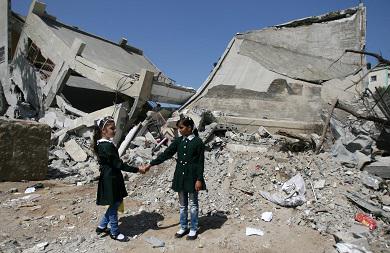
An average of four schools or hospitals are attacked or occupied by armed forces and groups every day – according to UNICEF analysis released ahead of the World Humanitarian Summit.
The findings, drawn from the most recent Report of the UN Secretary-General on Children and Armed Conflict, come in the wake of recent attacks on education and health facilities and workers – including the bombing of schools in Yemen, and a strike on a hospital in Aleppo, Syria on 27 April, that killed at least 50 people, including one of the last paediatricians in the area.
“Children are being killed, wounded, and permanently disabled in the very places where they should be protected and feel safe,” said Afshan Khan, UNICEF’s Director of Emergency Programmes.
“Attacks against schools and hospitals during conflict are an alarming, and disgraceful, trend. Intentional and direct strikes on these facilities, and on health workers and teachers, can be war crimes. Governments and other actors need to urgently protect schools and hospitals by upholding the provisions of international humanitarian law and international human rights law, and states must sign the Safe Schools Declaration.”
Attacks against schools and hospitals are one of the six grave violations against children identified and addressed by the UN Security Council. The last Report of the UN Secretary-General on Children and Armed Conflict documented more than 1500 incidents of attacks on, or military use of, schools and hospitals in 2014, including:
§ In Afghanistan 163 schools and 38 health facilities were attacked.
§ In Syria, 60 attacks on education facilities were recorded, as well as nine cases of military use of schools and 28 attacks on health facilities.
§ In Yemen, 92 schools were used for military purposes by armed forces and groups.
§ In South Sudan, there were seven incidents of attacks on schools and 60 involving military use.
§ A total of 543 educational facilities were damaged or destroyed in the State of Palestine and three attacks were documented on Israeli schools.
§ According to education authorities in Northeast Nigeria, a total of 338 schools were destroyed and damaged between 2012 and 2014.
Over the past year, the UN monitoring system has also documented so-called ‘double-tap’, or even ‘triple-tap’, strikes on healthcare facilities in which civilians are attacked, as well as the first responders arriving on the scene.
Beyond attacks on buildings, conflict has other far-reaching consequences on children’s education and healthcare. In Syria, for example, as well as attacks on hospitals, the removal of medical kits and surgical supplies from aid convoys, restrictions on medical evacuations, and killing of medical personnel, mean that access to critical and lifesaving healthcare for civilians in affected areas is diminishing day by day.
“Children are being abducted from their schools in horrific circumstances in countries like Nigeria and South Sudan, while others are being raped, or recruited and used as child soldiers,” said Khan.
The very first World Humanitarian Summit will take place in Istanbul on the 23rd and 24th of May. Global leaders will discuss how to effectively respond to major humanitarian emergencies, and how to be better prepared to meet challenges of the future.
Source: UNICEF
 FR
FR EN
EN AR
AR








